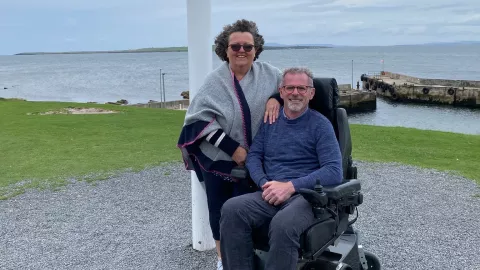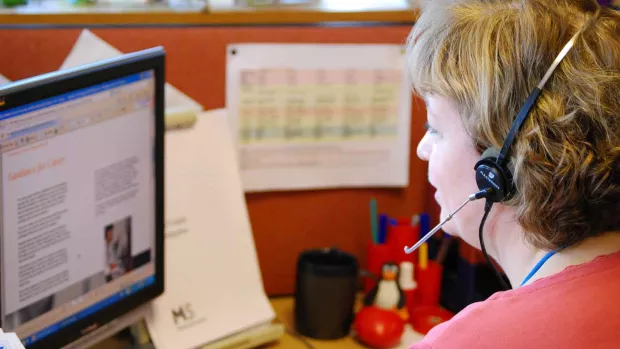
My experience of caring for my husband with MS
Marie Nixon, who’s married to MS Society Ambassador Stuart Nixon MBE, tells us about her experiences of juggling work with caring.
The couple live in Newport, Wales. Marie has cared for Stuart, who has secondary progressive MS, for over 25 years.
How do you care for Stuart?
Stuart was diagnosed with MS when he was 18. As his MS progressed, he went from using a stick to using an electric wheelchair full time. He now only has functional use of his left arm. But that doesn’t stop him. He can still make an amazing curry.
I work three days a week. I love my job in the health service as an NHS practice educator. But, work and caring can be tough bedfellows. Flexibility and planning are essential. Stuart needs help with things like moving around, getting in and out of bed and getting dressed. At times, I feel like I’ve done a full day’s work before I’ve even left the house! When I’m not at work, I’m caring full time for Stuart. There is no time off.
We've always said that we both have MS, it affects us both. Any decisions are always made as a family.
What has been your experience of getting help with caring?
We have mostly supported one another. But at the beginning of 2022, we needed help when Stuart was very poorly and was discharged from hospital. The care from social services he received seemed very unprofessional. We had different carers on each call and Stuart complained to me ‘I feel so tired, I’m sick of repeating myself.’ We were both frustrated. I stopped the care package one day but nobody asked us why!
Stuart has recently done some work with social care commissioning teams in Wales. He’s helped design some training for situations that can happen in real life. It’s not finalised yet, but we’re positive that this will help others with similar experiences to us.
How easy has it been to get support and information?
People don’t talk about caring. It’s hard work both mentally and physically. Social services and the NHS expect you to care for your loved one because you love them. I’m not routinely asked if I need support. In all this time, I’ve only ever been asked once or twice. My usual response is to burst into tears. It always takes me by surprise!
Stuart has said that when you have a disability, people assume you immediately know everything there is to know about it. But that’s not the case! As a carer, I have to actively seek out information. No one from social services has told me about the benefits I’m eligible for and what discount schemes are available. Or that I can get advance notice of anything happening to my energy supply.
Read our pages on other financial help
You can also read about financial support on the Carers UK website
How has your workplace supported you?
My work have been absolutely amazing. Within the health service in Wales, staff like me have benefitted from a flexible working policy for the last 15 years. When Stuart was in hospital, I was able to visit him and work from home when I could. It was important to me to work while Stuart was ill. I needed to maintain that sense of purpose that work can give you.
What support do you think working carers need?
My employers have offered unpaid emergency leave for years. The Carer’s Leave Act will give everyone in the UK the legal right to five days unpaid leave. This is a step in the right direction. But, as carers, we save the state millions every year by providing all the care ourselves. So not only are we providing the care alone, we’re taking time off work to do so. This should be paid carer’s leave.
Read more about carers' rights at work
The future of carers’ rights
Marie’s story is a reminder of how important support is for carers who are working. This can be made more difficult by a lack of appropriate social care and information about caring for someone with MS.
The Carer’s Leave Act is coming into effect next year. This will give all carers the right to five days of unpaid leave for their caring responsibilities. But there is still a lot more to be done to improve support for carers. We're continuing to call on the UK Government to reform Carer’s Allowance as part of the Carer Poverty Coalition.
Read more about support for carers




